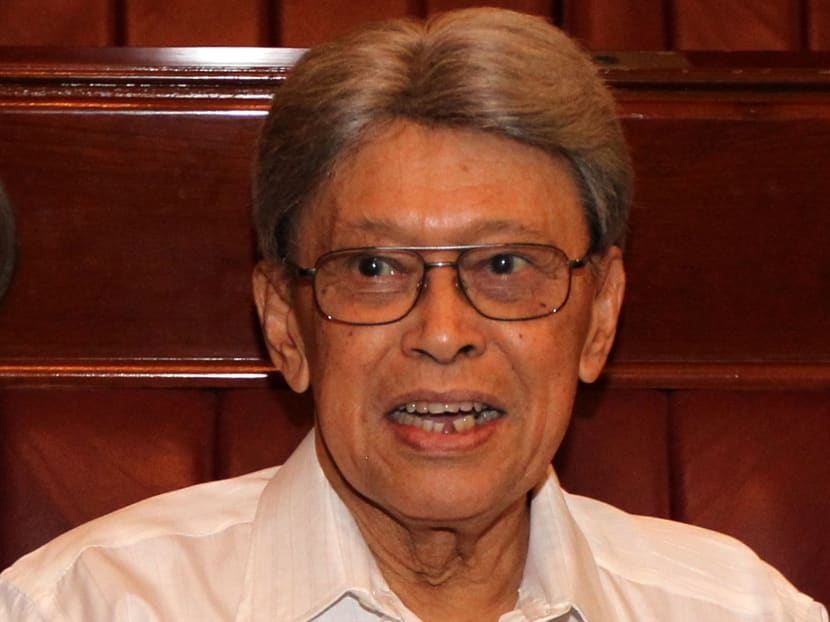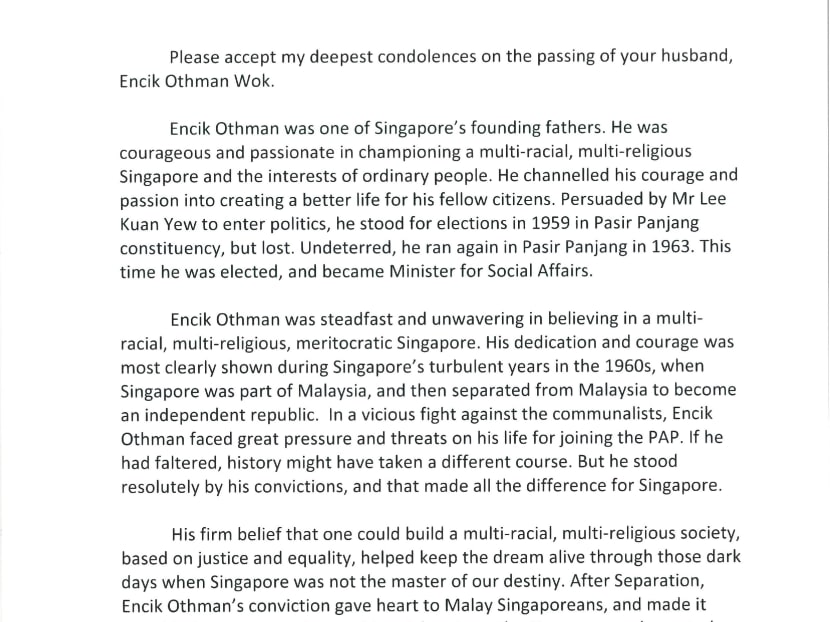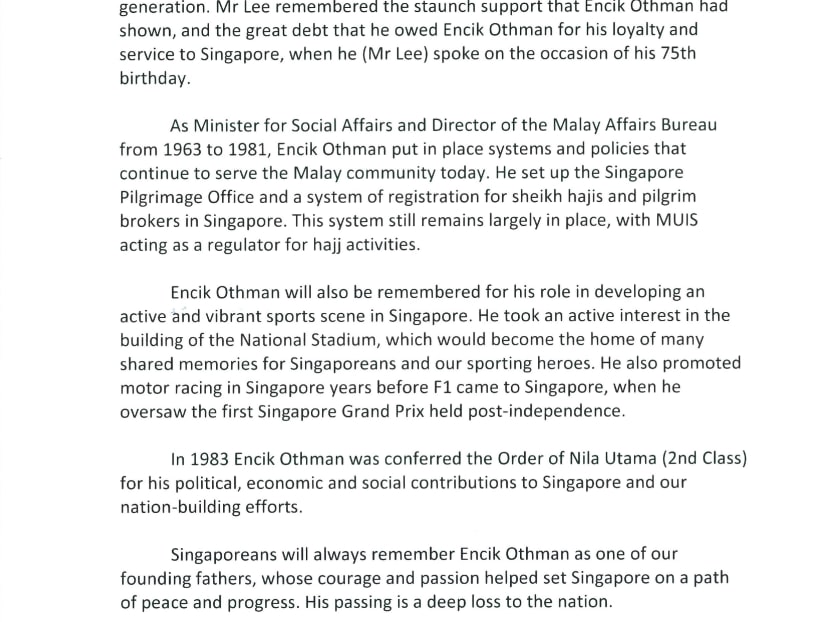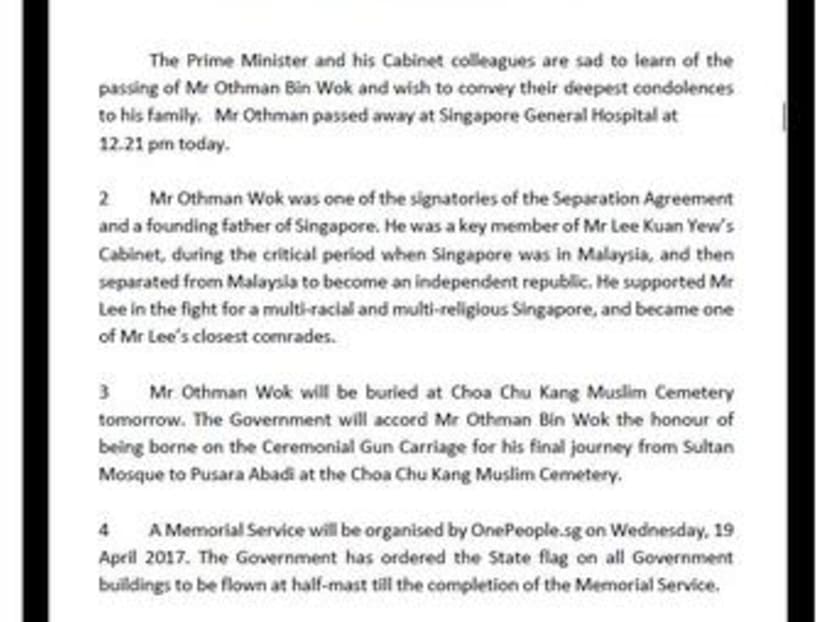Othman Wok, who helped PAP secure Malay ground, dies
SINGAPORE — Mr Othman Wok, a key member of the Old Guard whose unwavering support for the Government’s multiracial stand helped the People’s Action Party (PAP) secure the Malay ground during the turbulent 1960s, has died at the age of 92.

Othman Wok was a key member of the Old Guard who helped the PAP secure the Malay ground during the turbulent 1960s. TODAY file photo
SINGAPORE — Mr Othman Wok, a key member of the Old Guard whose unwavering support for the Government’s multiracial stand helped the People’s Action Party (PAP) secure the Malay ground during the turbulent 1960s, has died at the age of 92.
He died at the Singapore General Hospital at 12.21pm on Monday (April 17) after a protracted battle with cancer, leaving behind his second wife and four daughters from his two marriages. He had been ill for some time.
The Government ordered the State flag on all government buildings to be flown at half-mast until Wednesday, after the completion of a memorial service organised by OnePeople.sg.
A private wake was held at his family home on Kew Avenue off Upper East Coast Road yesterday, with President Tony Tan and Prime Minister Lee Hsien Loong among those who turned up to pay their respects.
In his condolence letter addressed to Mr Othman’s wife, Madam Lina Abdullah, PM Lee described the former Social Affairs minister as one of Singapore’s founding fathers, and paid tribute to his courage and passion, which were channelled into “creating a better life for his fellow citizens”.
PM Lee said: “He was courageous and passionate in championing a multiracial, multi-religious Singapore and the interests of ordinary people.”
Stressing Mr Othman’s pivotal role following Singapore’s separation from Malaysia in 1965, PM Lee said his conviction “gave heart to Malay Singaporeans, and made it possible for us to remain a multiracial society”.
“The Singapore we know today could not have existed without Encik Othman and others of our founding generation,” he added.


On Tuesday, Mr Othman’s body will be moved to Sultan Mosque, which was closed to visitors on Monday. The mosque’s manager, Mr Zainal Abidin Omar, said regular prayers will start shortly after 1pm, followed by prayers for Mr Othman.
After that, Mr Othman will make his final journey to Pusara Aman at Choa Chu Kang Muslim Cemetery. In a statement on Monday, the Prime Minister’s Office (PMO) said Mr Othman will be accorded the honour of being borne on the Ceremonial Gun Carriage for the journey to the cemetery.
The Mufti of Singapore, Dr Mohamed Fatris Bakaram, will lead the last rites.
Mr Othman’s son-in-law, Mr Munir Shah, told TODAY that the past two years had been very trying for the family. Mr Othman was in and out of the hospital, and was last warded on April 6, and had been in hospital since.
The 64-year-old consultant, who is the husband of Mr Othman’s youngest daughter from his first marriage, said that although Mr Othman was conscious on Sunday, “we could see he was fading out”.
He added: “His family was with him till his last breath. According to the doctor, he was aware of the people he could hear but he could not respond because he had difficulty breathing. He was kept on the ventilator.”
Tributes poured in for Mr Othman after the news of his death broke, with many hailing his contribution to multiracialism in Singapore and its importance in the Republic’s early years. They also lauded Mr Othman’s pioneering work in the social sector and sports scene.
In a Facebook post, Dr Tan said Mr Othman’s sacrifices and hard work contributed to Singapore’s success. “He fought for a multiracial Singapore that served the needs of all people regardless of race, language and religion, and was one of the Malay community’s strongest advocates of racial and religious reconciliation,” he said.
Adding that Mr Othman continued to encourage the Malay community to work hard and compete on the basis of meritocracy even after he retired from politics, Dr Tan said: “Today, the Malay community in Singapore is doing well and can be proud of their accomplishments, mainly because of the strong foundations that Mr Othman Wok helped establish.”
In its statement, the PMO described Mr Othman as “a key member of Mr Lee Kuan Yew’s Cabinet, during the critical period when Singapore was in Malaysia, and then separated from Malaysia to become an independent Republic”.
It added: “He supported Mr Lee in the fight for a multiracial and multi-religious Singapore, and became one of Mr Lee’s closest comrades.”

FROM ‘ORDINARY MALAY CHAP’ TO FOUNDING PAP MEMBER
Mr Othman was among the leaders who signed the Independence of Singapore Agreement on Aug 9, 1965. He was Singapore’s first Social Affairs Minister from 1963 to 1977. With his death, Mr Ong Pang Boon and Mr Jek Yeun Thong are the only two surviving members of Singapore’s first Cabinet.
The son of a Malay school principal who attended English-medium schools, Mr Othman’s contributions include helping to establish the Islamic Religious Council of Singapore (Muis) and the Mosque Building Fund. He was also the man who saw to the construction of the original National Stadium.
Born to Wok Ahmad and housewife Embon Mohamad, the former minister worked as a radio technician at East Coast Road, before joining Malay-language newspaper Utusan Melayu. The journalist went on to become a union leader, a politician and an ambassador.
He held a firm belief in multiracialism, something he attributed to his education in an English school. “Going to an English school changed my life; for the first time, I was in a school with members of other races. This was where I got my multiracial outlook,” he wrote in his biography.
But multiracialism was still an unfamiliar concept then. In his formal entry into politics in 1959, Mr Othman lost his first election race in Kampong Kembangan to the United Malays National Organisation, which had a stronghold in predominantly Malay constituencies. He was called an infidel, a traitor to the Malay community, and even had his election posters smeared with faeces.
Yet, he continued working the ground and won over the people in Pasir Panjang in 1963 by less than 1,000 votes. After winning the seat, he resigned from Utusan Melayu and took up a Cabinet post.
Following Singapore’s independence, Mr Othman was also tasked with convincing the Malays that they would be looked after despite being a minority race.
On his involvement in politics, Mr Othman said: “I thought I’d just be an ordinary Malay chap working in a radio shop ... I never thought I’d become a union leader, or that I would become one of the founding members of the PAP.”
But his political work and his first wife Cik Dah’s illness took a toll on his marriage. He later met divorcee Lina Abdullah and married her secretly in 1975.
Two years into his second marriage, he was posted as an ambassador to Indonesia while retaining his position as a minister. When the late Mr Lee found out about his marital situation, he gave Mr Othman the go-ahead to work in Indonesia, but added that if he could not solve his problems, he had to “pack up”.
During his three-year stint as an ambassador, Mr Othman sought to improve bilateral relations after Singapore’s hanging of two Indonesian marine commandos responsible for the 1965 bombing of MacDonald House in Orchard Road.
In 1981, Mr Othman stepped down from politics. “I decided to retire because at that time, the PAP was looking for new blood, so I wrote a letter to the PM giving two reasons: One was the need for new blood, and the other was because I could not solve my personal problems,” he said.
After retiring from politics, he became a board member on the Singapore Tourist Promotion Board and the Sentosa Development Corporation. Rediscovering his love of writing again, Mr Othman also penned ghost stories for the Malaysian Utusan Melayu until 1987. He went on to publish three compilations of his horror stories, in addition to his biography.
While looking back at his contributions in his biography, Mr Othman said: “I think I’ve done the best that I could do. What Singapore has to be proud of is not the work of any one person. It took not just Cabinet ministers or MPs, but the entire people of Singapore to bring us to where we are today.”








